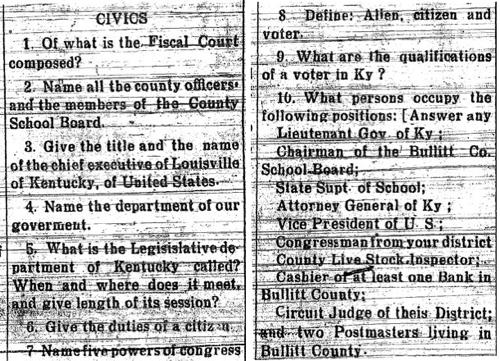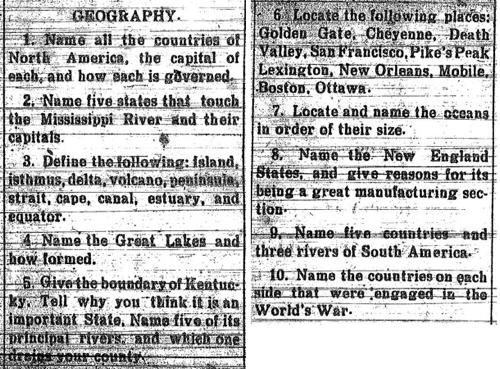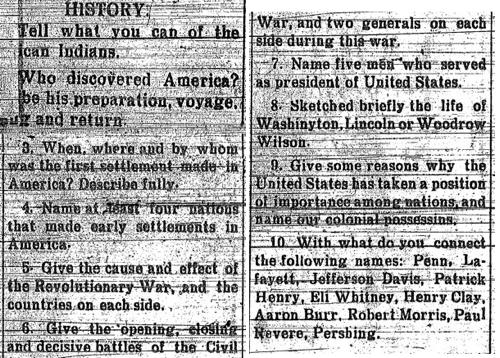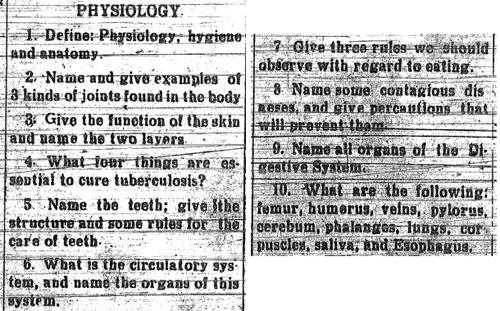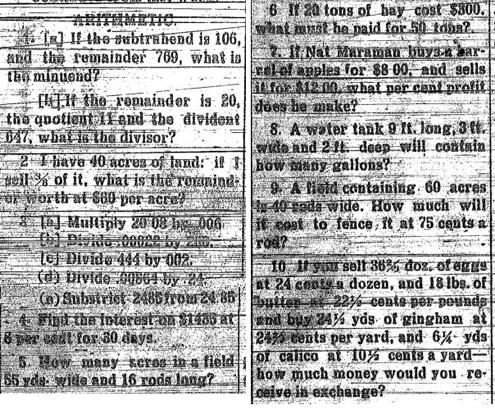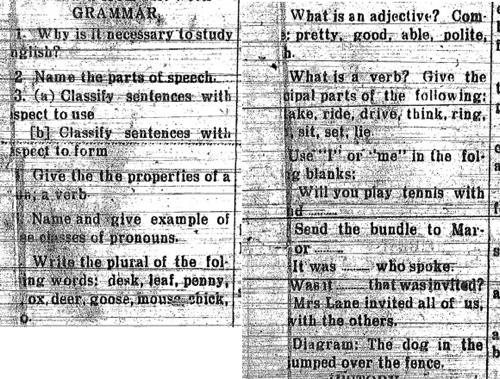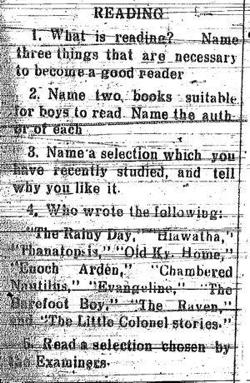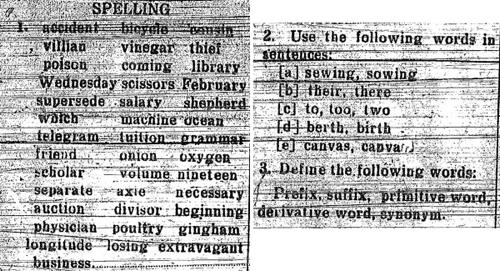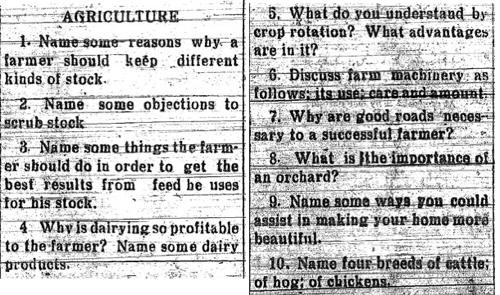1923 Bullitt County Common School Diploma Exam
This Bullitt County Common School Diploma Examination was published in The Pioneer News in sections in their May 18, May 25, and June 1, 1923 issues. These images are taken from microfilm which accounts for their poor quality. We have transcribed the text as accurately as we can.
If you are looking for the 1912 Exam instead of this one, it is located on another page here.
Civics
- Of what is the Fiscal Court composed?
- Name all the county officers and the members of the County School Board.
- Give the title and the name of the chief executive of Louisville, of Kentucky, of United States.
- Name the departments of our government.
- What is the legislative department of Kentucky called?
When and where does it meet, and give length of its session?
- Give the duties of a citizen.
- Name five powers of Congress.
- Define: alien, citizen and voter.
- What are the qualifications of a voter in Kentucky?
- What persons occupy the following positions:
- Lieutenant Governor of Kentucky;
- Chairman of the Bullitt County School Board;
- State Superintendent of Schools;
- Attorney General of Kentucky;
- Vice President of the United States;
- Congressman from your district;
- County Live Stock Inspector;
- Cashier of at least one bank in Bullitt County;
- Circuit Judge of this district;
- and two postmasters living in Bullitt County.
Geography
- Name all the countries of North America, the capital of each, and how each is governed.
- Name five states that touch the Mississippi River and their capitals.
- Define the following: island, isthmus, delta, volcano, peninsula, strait, cape, canal, estuary, and equator.
- Name the Great Lakes and how formed.
- Give the boundary of Kentucky.
Tell why you think it is an important state.
Name five of its principal rivers, and which one drains your county.
- Locate the following places:
- Golden Gate,
- Cheyenne,
- Death Valley,
- San Francisco,
- Pike's Peak,
- Lexington,
- New Orleans,
- Mobile,
- Boston,
- Ottawa.
- Locate and name the oceans in order of their size.
- Name the New England States, and give reasons for its being a great manufacturing section.
- Name five countries and three rivers of South America.
- Name the countries on each side that were engaged in the World's War.
History
- Tell what you can of the American Indians.
- Who discovered America?
Describe his preparation, voyage, and return.
- When, where, and by whom was the first settlement made in America?
Describe fully.
- Name at least four nations that made early settlements in America.
- Give the cause and effect of the Revolutionary War, and the countries on each side.
- Give the opening, closing and decisive battles of the Civil War, and two generals on each side during this war.
- Name five men who served as President of the United States.
- Sketched briefly the life of Washington, Lincoln, or Woodrow Wilson.
- Give some reasons why the United States has taken a position of importance among nations, and name our colonial possessions.
- With what do you connect the following names:
- Penn,
- Lafayette,
- Jefferson Davis,
- Patrick Henry,
- Eli Whitney,
- Henry Clay,
- Aaron Burr,
- Robert Morris,
- Paul Revere,
- Pershing.
Physiology
- Define: physiology, hygiene and anatomy.
- Name and give examples of 3 kinds of joints found in the body.
- Give the function of the skin, and name the two layers.
- What four things are essential to cure tuberculosis?
- Name the teeth; give the structure and some rules for the care of teeth.
- What is the circulatory system, and name the organs of this system.
- Give three rules we should observe with regard to eating.
- Name some contagious diseases, and give precautions that will prevent them.
- Name all organs of the digestive system.
- What are the following:
- femur,
- humerus,
- veins,
- pylorus,
- cerebrum,
- phalanges,
- lungs,
- corpuscles,
- saliva, and
- esophagus?
Arithmetic
- [a] If the subtrahend is 106, and the remainder 769, what is the minuend?
[b] If the remainder is 20, the quotient 11, and the dividend 647, what is the divisor?
- I have 40 acres of land. If I sell 3/8 of it, what is the reminder worth at $60 per acre?
- [a] Multiply 20.08 by .006.
[b] Divide .00022 by 200.
[c] Divide 444 by .002.
[d] Divide .00864 by .24.
[e] Subtract 2485 from 24.85.
- Find the interest on $1435 at 8 percent for 30 days.
- How many acres in a field 55 yards wide and 16 rods long?
- If 20 tons of hay cost $300, what must be paid for 50 tons?
- If Nat Maraman buys a barrel of apples for $8.00, and sells it for $12.00, what percent profit does he make?
- A water tank 9 feet long, 3 feet wide and 2 feet deep will contain how many gallons?
- A field containing 60 acres is 40 rods wide. How much will it cost to fence it at 75 cents a rod?
- If you sell 36 2/3 dozen of eggs at 24 cents a dozen, and 18 lbs of butter at 22 1/2 cents per pounds and buy 24 1/2 yards of gingham at 24 2/3 cents per yard, and 6 1/4 yards of calico at 10 1/2 cents a yard - how much money would you receive in exchange?
Grammar
- Why is it necessary to study English?
- Name the parts of speech.
- [a] Classify sentences with respect to use.
[b] Classify sentences with respect to form.
- Give the properties of a noun; a verb.
- Name and give example of classes of pronouns.
- Write the plural of the following words: desk, leaf, penny, fox, deer, goose, mouse, chick.
- What is an adjective? Compare: pretty, good, able, polite.
- What is a verb? Give the principal parts of the following: take, ride, drive, think, ring, sit, set, lie.
- Use "I" or "me" in the following blanks:
Will you play tennis with Jack and ___.
Send the bundle to Margaret and ___.
It was ___ who spoke.
Was it ___ that was invited?
Mrs. Lane invited all of us, ___ with the others.
- Diagram: The dog in the field jumped over the fence.
Reading
- What is reading?
Name three things that are necessary to become a good reader.
- Name two books suitable for boys to read.
Name the author of each.
- Name a selection which you have recently studied, and tell why you like it.
- Who wrote the following:
- "The Rainy Day,"
- "Hiawatha,"
- "Thanatopsis,"
- "Old Kentucky Home,"
- "Enoch Arden,"
- "Chambered Nautilus,"
- "Evangeline,"
- "The Barefoot Boy,"
- "The Raven," and
- "The Little Colonel Stories."
- Read a selection chosen by the examiners.
Writing
- What are the essentials of good penmanship?
- Make and name the principles used in writing.
- Copy the following as a specimen of your penmanship:
"Lives of great men all remind us
We can make our lives sublime
And departing leaves behind us
Footprints on the sands of time."
Composition
1. Write a composition of 100 words on "This Examination."
Spelling
- accident, bicycle, cousin, villain, vinegar, thief, poison, coming, library, Wednesday, scissors, February, supersede, salary, shepherd, which, machine, ocean, telegram, tuition, grammar, friend, onion, oxygen, scholar, volume, nineteen, separate, axis, necessary, auction, divisor, beginning, physician, poultry, gingham, longitude, losing, extravagant, business
- Use the following words in sentences:
[a] sewing, sowing
[b] their, there
[c] to, too, two
[d] berth, birth
[e] canvas, canvass
- Define the following words: prefix, suffix, primitive word, derivative word, synonym.
Agriculture
- Name some reasons why a farmer should keep different kinds of stock.
- Name some objections to scrub stock.
- Name some things the farmer should do in order to get the best results from feed he uses for his stock.
- Why is dairying so profitable to the farmer?
Name some dairy products.
- What do you understand by crop rotation?
What advantages are in it?
- Discuss farm machinery as follows: its use, care, and amount.
- Why are good roads necessary to a successful farmer?
- What is the importance of an orchard?
- Name some ways you could assist in making your home more beautiful.
- Name four breeds of cattle, of hogs, of chickens.
If you, the reader, have an interest in any particular part of our county history, and wish to contribute to this effort, use the form on our Contact Us page to send us your comments about this, or any Bullitt County History page. We welcome your comments and suggestions. If you feel that we have misspoken at any point, please feel free to point this out to us.

